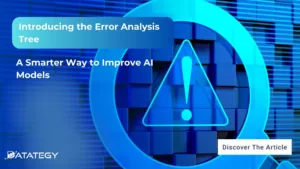Scaling RAG Systems in Financial Organizations Artificial intelligence has emerged...
Read MoreAI-Driven Supply Chain Management:
4 Game-Changing Use Cases
Table of Contents
ToggleArtificial intelligence has changed the way we work, improving our intrinsic capabilities and decision-making. In this area, the supply chain seems to be a tangible area where artificial intelligence has made a big difference through lower operating costs, improved productivity, reduced labor costs, shorter lead times, and on-time delivery.
The latest study shows that 61% of manufacturing executives report lower costs and 53% higher revenues as a direct result of introducing artificial intelligence into the supply chain (McKinsey).
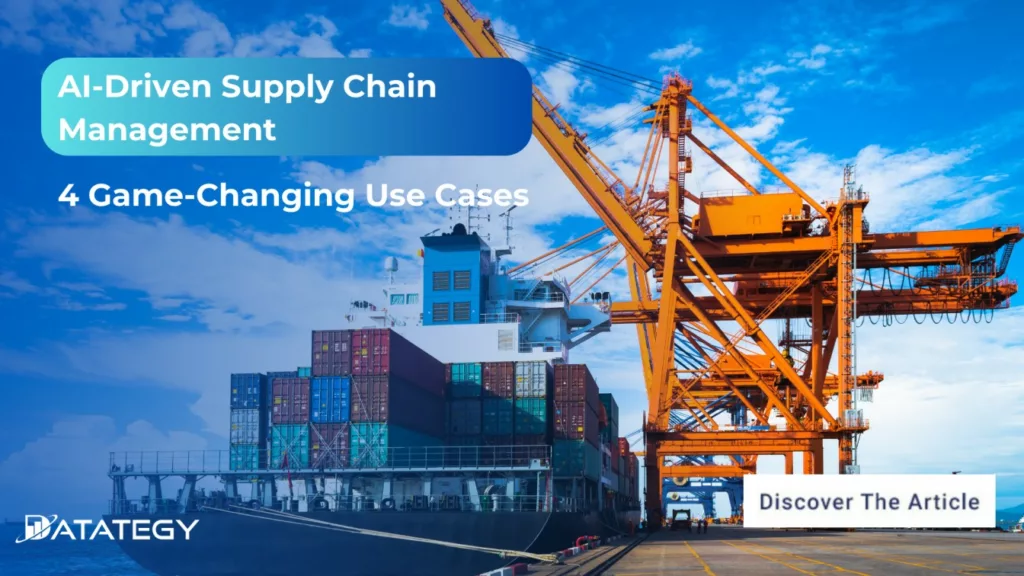
In this article, we’ll look at the main use cases in the supply chain sector and the benefits for businesses.
Global Supply Chain AI Adoption Overview
From 2022 to 2025, businesses involved in manufacturing and supply chains are anticipated to embrace artificial intelligence (AI) at a faster rate. More than a third of CEOs predicted that by 2022, AI will be widely used in businesses.
The supply chain industry saw a huge change in 2022 as more firms realized how crucial it was to mainstream and incorporate information technology (IT) into their daily operations. The realization by businesses that adopting technology was not only a choice but a must for being effective and competitive in the quickly changing business environment marked a turning point.
The focus on implementing new technologies has grown as 2023 approaches, with artificial intelligence (AI) taking center stage as a crucial element of contemporary supply chain management. Companies are currently aggressively tackling the problem of selecting the optimal AI-powered processes that match their particular needs and goals.
This entails carefully assessing numerous AI use cases, choosing the most appropriate ones, and identifying the appropriate platforms or solutions to successfully drive these use cases.
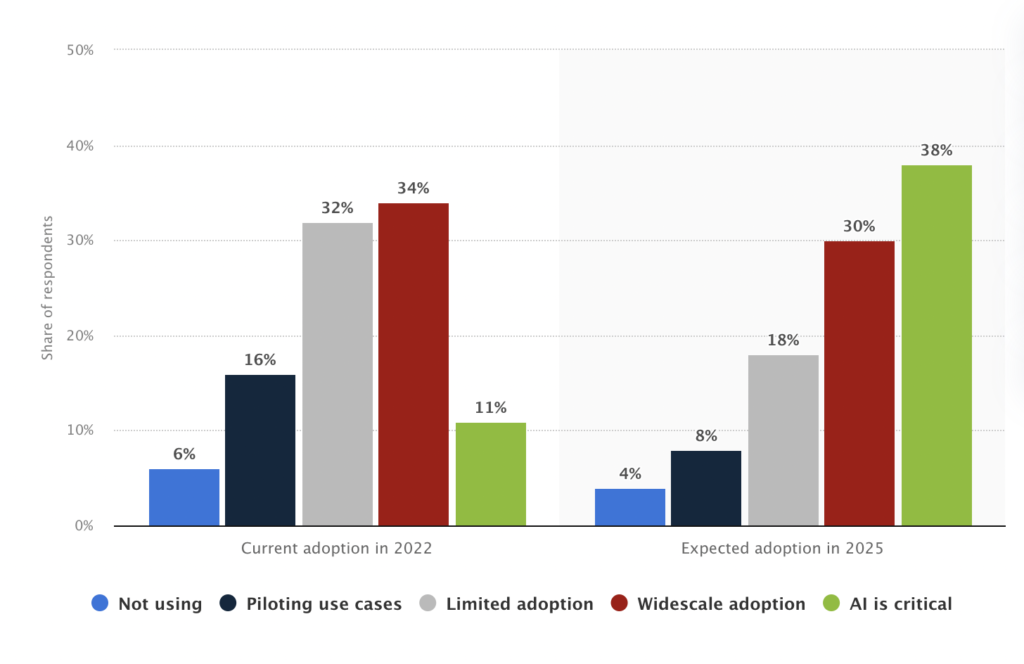
Source: Statista
Top AI 4 Use Cases for Supply Chain Optimization:
1- Fleet management
The incorporation of artificial intelligence (AI) has emerged as a game-changer in the fast-changing environment of supply chain management, especially in the area of fleet management. A study by Deloitte found that AI can help fleet managers improve efficiency by up to 10%.
Supply chain businesses are revolutionizing their operations, increasing efficiency, and enhancing customer service by utilizing AI technology. Predictive maintenance, real-time route optimization, and fuel efficiency improvements are just a few of the applications that fall under the umbrella of AI-driven fleet management.
The capacity of AI in fleet management to optimize routes in real-time while taking into account dynamic elements like traffic, weather, and delivery schedules is one of its most prominent benefits. This not only lowers transportation costs but also guarantees on-time delivery, which is essential for the success of a supply chain. Furthermore, by examining data from sensors and previous maintenance logs, AI-powered predictive maintenance solutions assist prevent vehicle problems.
With this proactive strategy, downtime is kept to a minimum, maintenance costs are kept to a minimum, and fleet asset lifespan is increased. As AI develops, its use in supply chain fleet management has the potential to further improve operational effectiveness, save costs, and increase customer satisfaction, making it a crucial part of contemporary supply chain strategy.
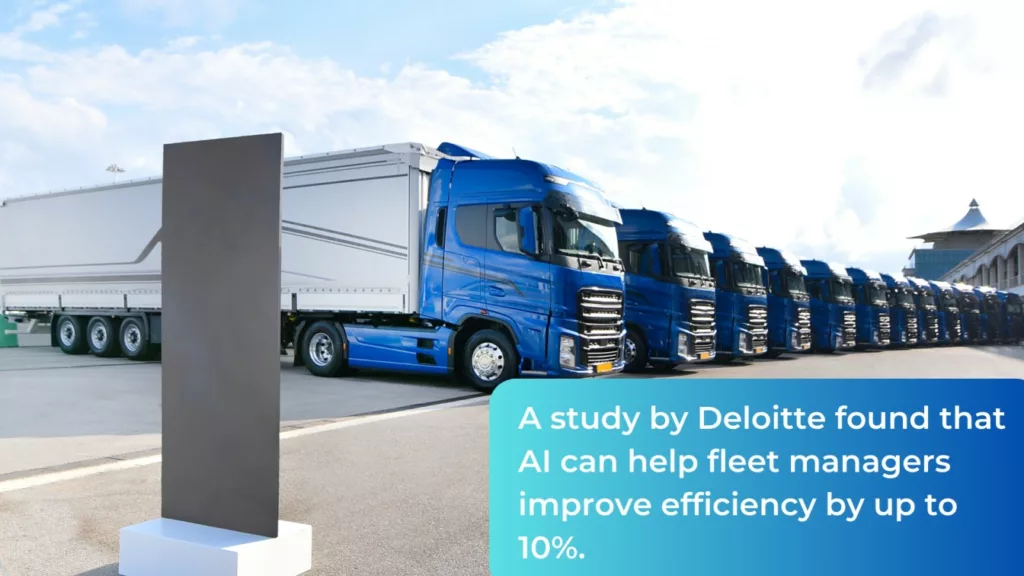
2- Warehouse automation
Processes like picking, packaging, and shipping have been streamlined and optimized through the incorporation of AI-driven solutions, making them more effective, accurate, and efficient. AI can help to increase warehouse productivity by up to 20%, according to a study by McKinsey & Company.
The selection process is one of the most notable uses of AI in warehouse management. Robots that are driven by AI and have computer vision capabilities can cruise warehouse shelves, identify items, and collect them with astounding accuracy, greatly decreasing picking mistakes and speeding up order fulfillment.
The use of AI in shipping and packing has grown in importance. AI algorithms can choose the best packing type and size, cutting down on waste and delivery expenses. AI-driven sorting systems may also categorise goods automatically according to destination and delivery mode, assuring prompt and accurate dispatch.
Artificial intelligence’s capacity to adapt, learn, and optimise these warehouse activities is essential as supply chains’ complexity and volume continue to increase. It not only increases productivity but also frees up supply chain specialists to concentrate on critical duties, thereby boosting organisations’ overall competitiveness and customer happiness.
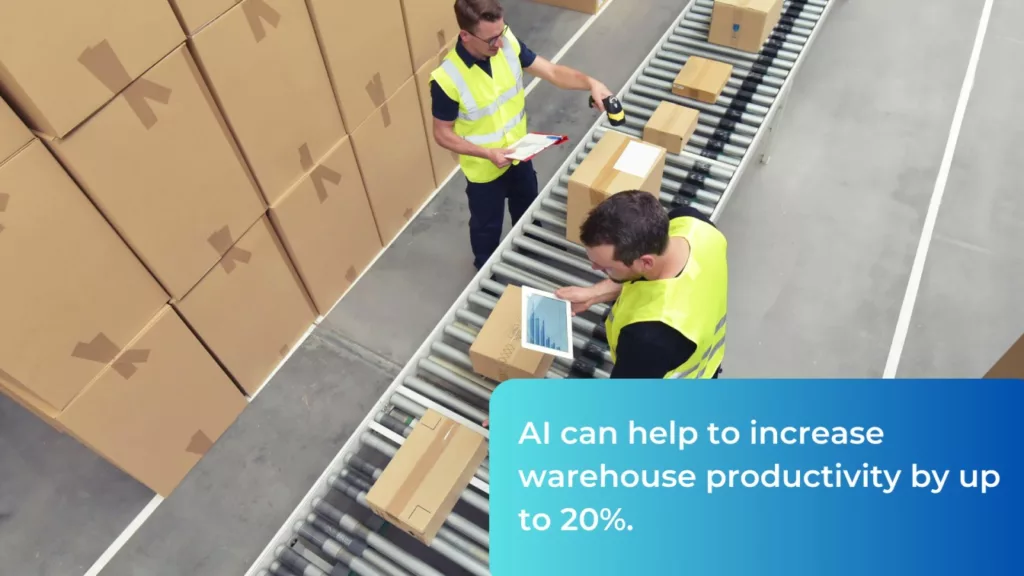
Demystifying AI: A Comprehensive Guide to Key Concepts and Terminology
This guide will cover the essential terminology that every beginner needs to know. Whether you are a student, a business owner, or simply someone who is interested in AI, this guide will provide you with a solid foundation in AI terminology to help you better understand this exciting field.

3- Inventory optimization
Traditional inventory control frequently used human forecasting and crude procedures, which resulted in inefficiencies, overstocking, and understocking problems. AI is a game-changer in this industry because of its sophisticated algorithms and data-driven insights inventory optimization can help businesses improve customer service by up to 15%, according to a study by PwC. This is due to AI’s ability to improve on-time delivery rates and reduce stockouts.
Data analysis, using information from previous sales data, seasonality trends, and market dynamics, is the first step in AI-driven inventory optimization. Algorithms that use machine learning can spot trends and oscillations that human planners would overlook.
These insights help companies have the right amount of inventory on hand, cut carrying costs, and guarantee that their items are accessible when clients need them. AI also makes it possible to estimate demand with astonishing precision, which aids supply chain specialists in making timely choices. Guaranteeing that items are always accessible, not only simplifies operations but also improves customer satisfaction, making it a crucial component in contemporary supply chain strategy.
AI promises to improve inventory management’s efficiency, save costs, and resilience as it develops and becomes more integrated with supply chains.
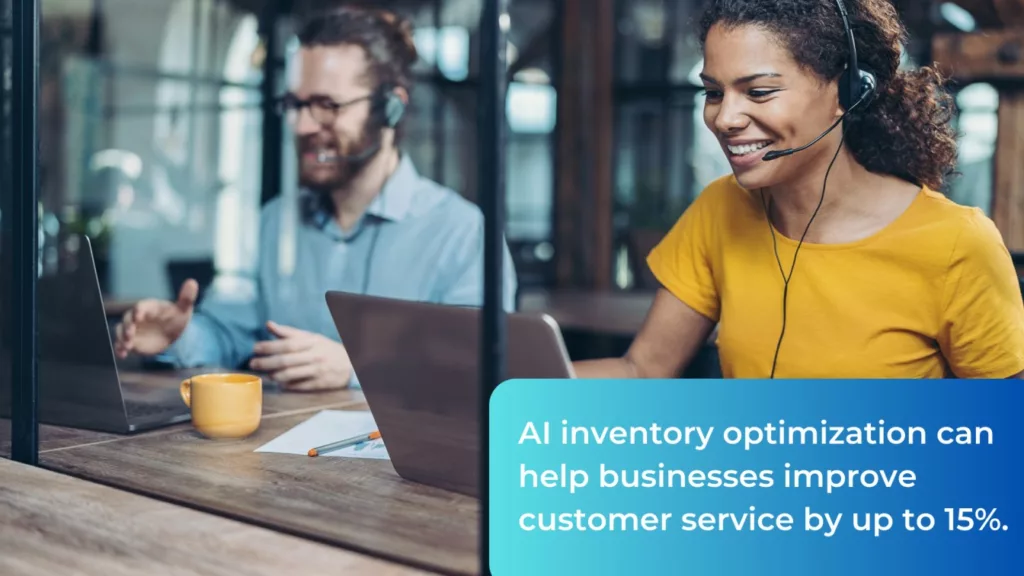
4- Predictive maintenance
Supply chain experts may now use AI predictive maintenance as a potent tool to identify problems before they arise, thereby saving time and money and maintaining smooth operations. AI predictive maintenance can help businesses reduce downtime by up to 20%, according to a study by McKinsey & Company. This is due to AI’s ability to predict and prevent equipment failures before they occur
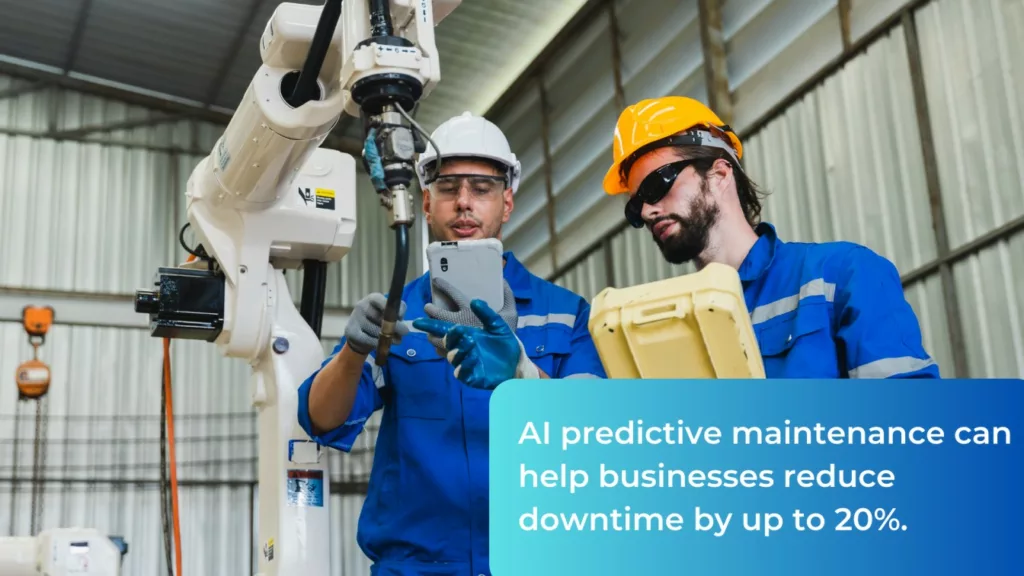
Strategies for Choosing the Optimal AI Technology for Your Business
With so many AI solutions available, it can be difficult to determine which technology is right for your industry. We identify some tips on how to choose the right AI solution for you, including considerations such as integration with existing systems, data privacy and security, and compatibility with your business needs.
Integration with Existing Systems: It’s crucial to think about how effectively an AI solution will interface with your current systems before selecting one. Your customer relationship management (CRM) system, your e-commerce platform, and other critical systems should be able to effortlessly interact with your AI solution. This will make it possible for your AI system to offer the greatest value and experience the least amount of downtime.
Data Security and Privacy: It’s crucial to safeguard client data security and privacy while implementing AI in your retail organization. To secure sensitive client data, use an AI system that has strong security controls like encryption and access control. In order to confirm that the vendor is committed to preserving your clients’ privacy, make sure to thoroughly check their data privacy policy.
Compatibility with Business Demands: every company has different needs and criteria that must be met. When selecting an AI solution, it’s critical to carefully consider how well the technology fits your company’s requirements. This entails taking into account the size of your company, the complexity of your operations, and the particular issues you are attempting to resolve. Instead of selecting a generic AI solution that might not match your goals, pick one that is specifically designed to address them.
Scalability: As your business grows, your AI needs will likely change as well. Choose an AI solution that is scalable, so that you can easily add new features and capabilities as your business evolves. This will help ensure that your AI solution remains relevant and valuable over time.
Build Your AI-Driven Supply Chain Solution with papAI Platform
Average result achieved with papAI solution
Average result achieved with papAI solution
Average result achieved with papAI solution
Harness the power of the papAI solution to unlock the full potential of AI within the supply chain sector. Develop a bespoke AI-driven solution tailored to your unique requirements. Employ state-of-the-art machine learning techniques to enhance the accuracy and efficiency of your predictive processes.
papAI simplifies data mining, cleansing, and visualization while ensuring transparent results, expediting the deployment of AI initiatives. Secure your demo today, and our team of experts will assist you in crafting a personalized AI solution that aligns seamlessly with your supply chain business needs.
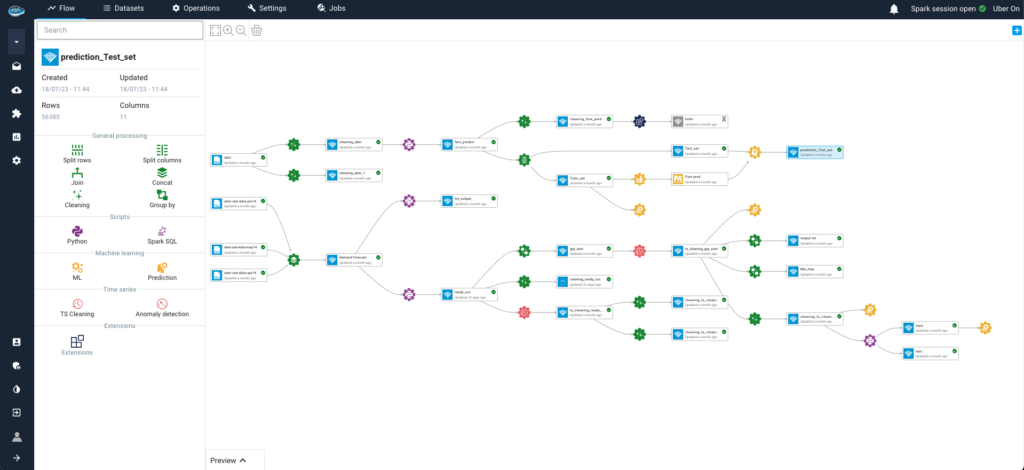
Interested in discovering papAI
Our team of AI experts will be happy to answer any questions you may have.
How AgenticAI is Transforming Sales and Marketing Strategies
How AgenticAI is Transforming Sales and Marketing Strategies Agentic AI...
Read More“DATATEGY EARLY CAREERS PROGRAM” With Abdelmoumen ATMANI
“DATATEGY EARLY CAREERS PROGRAM” With Abdelmoumen ATMANI Hello, my name...
Read MoreIntroducing the Error Analysis Tree: A Smarter Way to Improve AI Models
Introducing the Error Analysis Tree: A Smarter Way to Improve...
Read More


